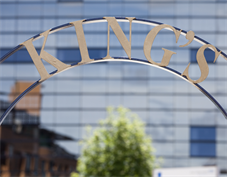King’s trials AI to aid early detection of bowel cancer
05 June 2023 - Ground-breaking study will investigate the use of the technology to improve patient outcomes

Patients across England could benefit from faster diagnosis and quicker treatment of colorectal cancers following a new trial of artificial intelligence (AI) to support the analysis of endoscopy findings.
Researchers at King’s College Hospital are leading this study, which will eventually involve 20 NHS Trusts across England, using a new AI tool that could help doctors identify abnormalities at an earlier stage, and speed up diagnosis.
The AI platform will be used by endoscopists at King’s – starting this summer until late 2024 – to help highlight abnormalities during an endoscopy, such as early cancers and colorectal polyps, and collect data on whether the technology helps improve early disease detection for colorectal cancer. It will be used during standard colonoscopies for the patients who undergo annual screening.
The platform uses advanced AI to highlight the presence of precancerous lesions with a visual marker in real-time – acting as a second observer. It will process images using advanced algorithms that can identify and mark abnormalities consistent with polyps, including small flat polyps that might otherwise go undetected by the human eye.
Dr Bu Hayee, Consultant Gastroenterologist and Principle Investigator of the study at King’s College Hospital, said: “I’m pleased to be working on this project to establish whether the use of artificial intelligence (AI) in colonoscopy might influence endoscopy performance and improve outcomes for patients. There has never been a greater need for innovation in the NHS and this research may be able to shine a light on the possible benefits this technology can provide.
“Our NAIAD study (National study of Artificial Intelligence in Adenoma Detection for colonoscopy) is set to explore the use of AI in a ‘real world’ setting, and how it might influence endoscopists in their day-to-day practice.”
The study is the result of set-up funding from NHS England, which ran a competition to identify and fast-track AI technology into clinical services.
Colorectal cancer is the third most common cancer globally. Screening is one of the most effective ways to prevent or diagnose it early, when it is most treatable. When detected early, 90% of patients can recover from colorectal cancer.
ENDS
Notes to editors
1. For further information contact: Lizzie Mills, Corporate Communications, King’s College Hospital NHS Foundation Trust. Tel: 020 3299 5935; e- mail: [email protected]
2. The system being trialled is the GI Genius™, which is an intelligent endoscopy module, distributed by Medtronic and manufactured by Cosmo Pharmaceuticals.
3. King’s College Hospital NHS Foundation Trust is one of the UK’s largest and busiest teaching hospitals. The Trust is recognised internationally for its work in liver disease and transplantation, neurosciences, cardiac, haemato-oncology, fetal medicine, stroke and major trauma.
4. Our hospitals include King’s College Hospital (Denmark Hill), the Princess Royal University Hospital (PRUH), and Orpington Hospital – we also provide some services at Beckenham Beacon and Queen Mary’s Hospital, Sidcup.
5. We provide care to 1.5 million patients in Southwark, Lambeth, Bromley, Bexley, Lewisham and elsewhere in south-east London and parts of Kent. In July, we launched our new strategy, Strong Roots, Global Reach, and our new vision to be BOLD.
